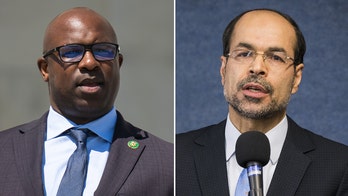Republican lawmakers, conservative activists and business groups are in an all-out push to sideline a campaign finance bill tracking toward a House vote that they describe as a politically motivated assault on free speech that gives special carve-outs for favored groups like labor unions.
Democrats have pitched the bill as a direct response to the January Supreme Court ruling that lifted restrictions on campaign spending. Sponsors say it will rein in the influence of special-interest money in the upcoming election.
But critics say the package does an end-run around the court, giving unions and the Democrats they support the upper hand in November. While the so-called DISCLOSE Act aims for transparency, opponents say what it really does is intimidate and deter organizations from engaging in any campaign activity.
"It tries to completely reverse what the Supreme Court has already ruled is unconstitutional. ... This is just a regulatory overreach in the making," said Mattie Corrao, government affairs manager for Americans for Tax Reform. "This is by and large an attempt to completely tilt the balance for the November election."
The bill's proponents cast it as a necessary legislative response to the Supreme Court's landmark ruling at the beginning of the year. The White House called the bill a "critical step in restoring our government to its rightful owners -- the American people."
Rep. Chris Van Hollen, D-Md., the lead sponsor in the House, said in a statement Wednesday that the legislation is needed to respond to the high court's "radical ruling" in January.
The court ruled in January that corporations can spend unlimited money on ads urging people to vote for or against candidates, a position that also can be applied to unions. The court struck down part of the landmark McCain-Feingold campaign finance bill that barred corporate- and union-paid issue ads in the closing days of election campaigns.
"Reform in Washington is never easy -- that is why powerful special interests are mobilizing against our effort to shine a light on campaign-related spending," Van Hollen said.
A House Republican aide said Democrats, looking to bring the bill to the floor imminently, are still working out "serious problems" on their end, and that most of the GOP caucus would probably hold together in opposition.
Corrao said Democrats have the votes to soon pass it out of the House, but the real battle will be in the Senate, where it's been sponsored by Sen. Charles Schumer, D-N.Y. House Democrats are planning to vote on the legislation Friday after broadening an exemption that would explicitly benefit the National Rifle Association.
But that schedule is in flux since that change drew outcries from liberal House members and dozens of nonprofit groups, including the Sierra Club, which wrote a letter to House Speaker Nancy Pelosi Wednesday decrying the special treatment. Other groups also are fighting for exemptions, which appeared to gum up forward progress on Thursday.
Opposition has been mounting since the bill was unveiled in late April, as dozens upon dozens of organizations have accused its Democratic sponsors of pushing a political agenda.
The bill would require the CEO, or highest-ranking official, in any company or group that produces a political ad to appear onscreen to endorse it. It also would require the same for the ad's top funder. And it would require groups engaging in political activity to disclose their top five donors.
The bill would impose new restrictions on corporations, unions and other special-interest groups, but doesn't treat all those organizations the same. For example, the bill would ban campaign activity from firms with federal contracts worth more than $50,000, as well as from firms with foreign ownership of 20 percent or more. It requires groups participating in campaign activity to report all donors contributing $600 or more.
Critics say that donation threshold would allow most unions to avoid having to list members, and they say the other restrictions would leave unions in the clear as well.
The bill also would impose several new disclosure requirements on corporations, unions and other groups. Among them, groups would be required to report expenses of $10,000 and up more than 20 days before an election, and expenses of $1,000 and up within 20 days of an election.
Groups like the National Right to Life Committee allege that such requirements are meant to "discourage" groups that are "disfavored" from putting up the ads in the first place. The anti-abortion group wrote in a letter to Congress Tuesday that the policy would expose "citizens who support such efforts to harassment and intimidation" and smother groups with paperwork.
Opponents of the legislation argue that all those restrictions taken together amount to a bid to discourage campaign activity. Americans for Tax Reform and dozens of other conservative groups wrote in a letter to the House last week that the bill would "strangle free speech."
The Chamber of Commerce and other business and trade groups wrote in a letter last month that "the intent is to deter, not to disclose and inform."




